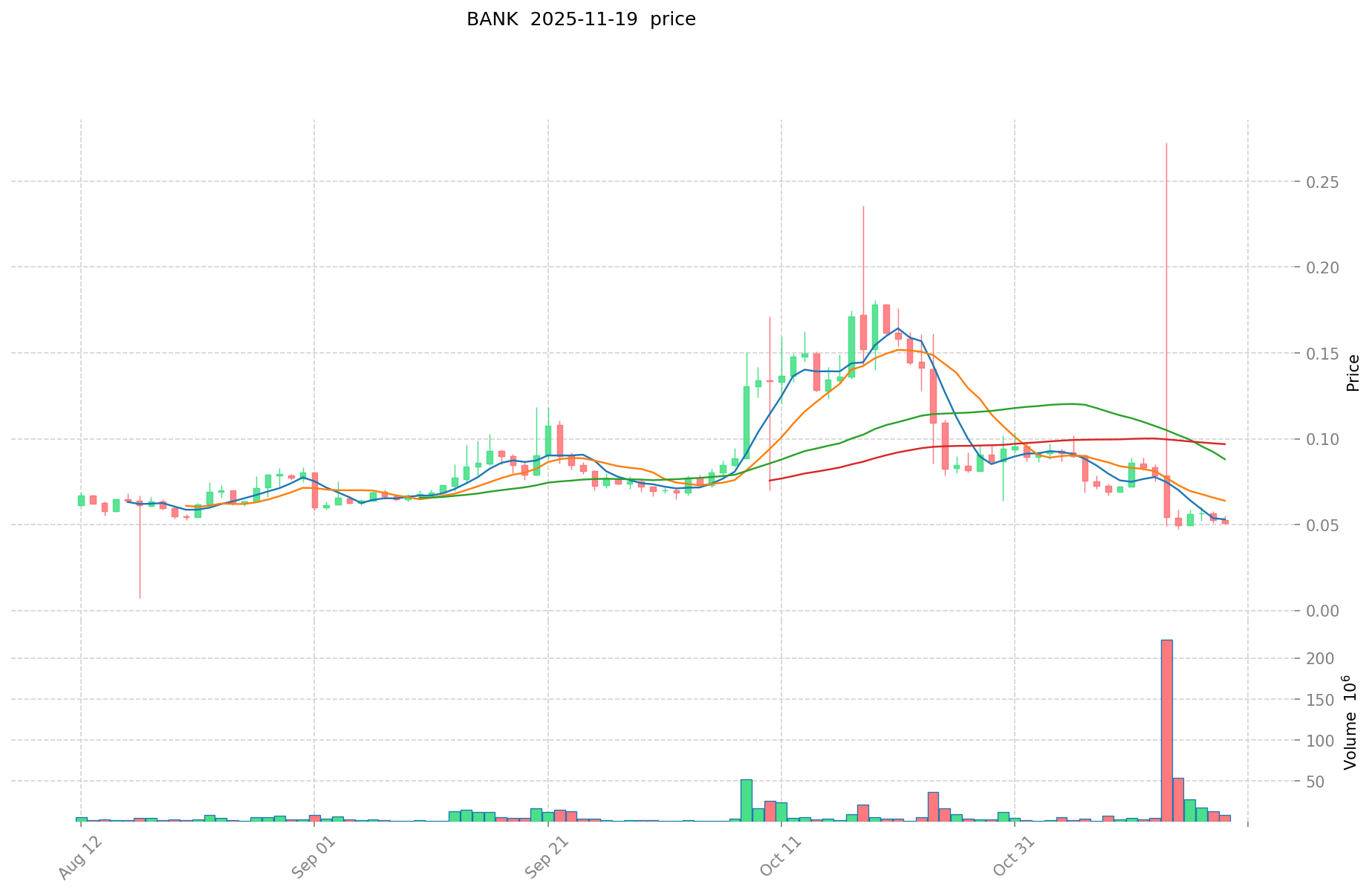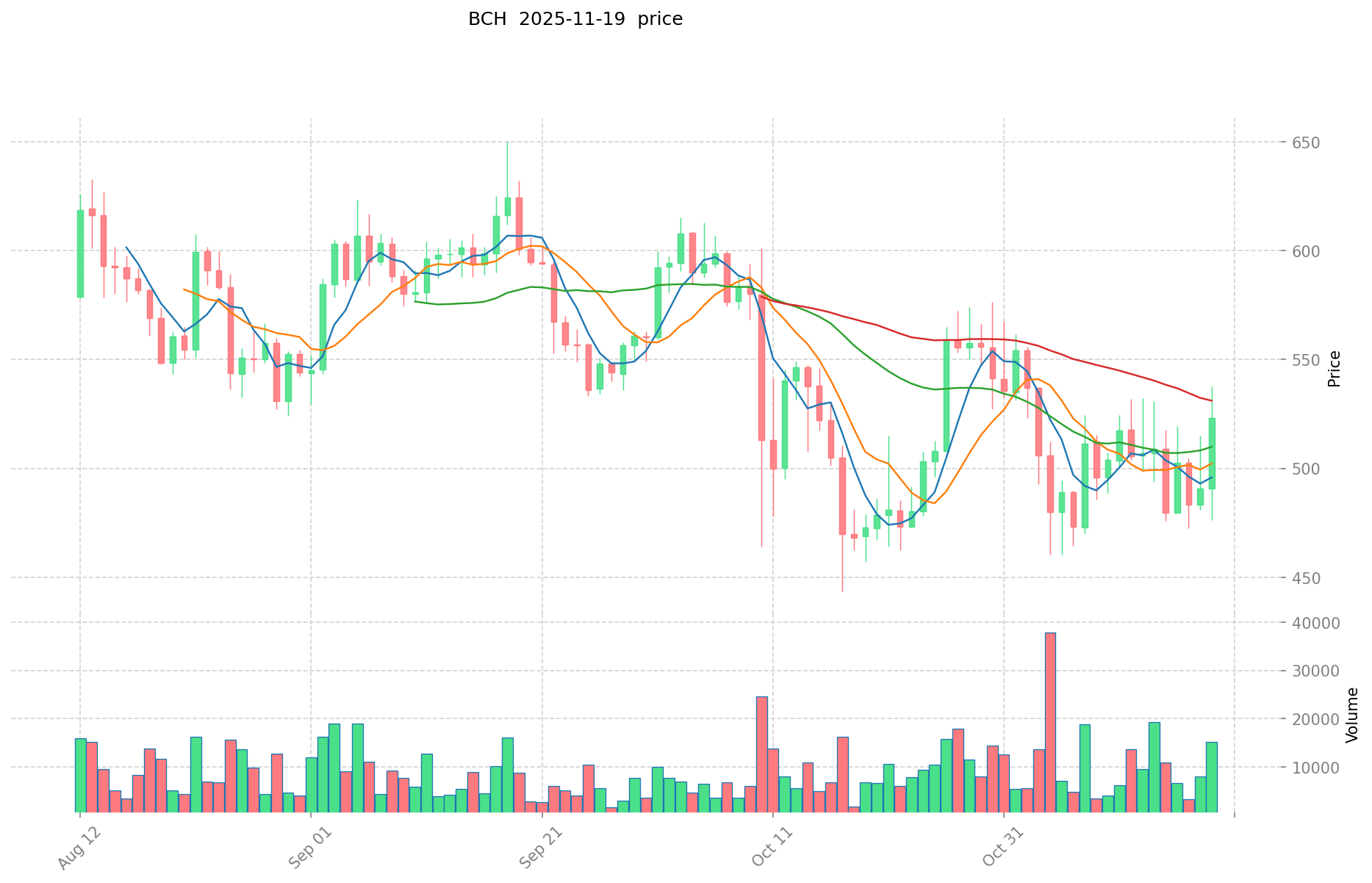BANK vs BCH: The Battle for Digital Financial Supremacy in the Cryptocurrency Era
Introduction: BANK vs BCH Investment Comparison
In the cryptocurrency market, the comparison between Lorenzo Protocol (BANK) vs Bitcoin Cash (BCH) has always been a topic that investors can't ignore. The two not only have significant differences in market cap ranking, application scenarios, and price performance, but also represent different positioning of crypto assets.
Lorenzo Protocol (BANK): Launched in 2025, it has gained market recognition for its institutional-grade asset management platform.
Bitcoin Cash (BCH): Since its inception in 2017, it has been hailed as a "peer-to-peer electronic cash system", and is one of the cryptocurrencies with the highest global trading volume and market capitalization.
This article will comprehensively analyze the investment value comparison between BANK vs BCH, focusing on historical price trends, supply mechanisms, institutional adoption, technological ecosystems, and future predictions, and attempt to answer the question that investors care about most:
"Which is the better buy right now?"
I. Price History Comparison and Current Market Status
BANK and BCH Historical Price Trends
- 2025: BANK launched as an institutional-grade asset management platform, with its price fluctuating as the market responded to its innovative offerings.
- 2017: BCH was created through a hard fork of Bitcoin, with its price surging initially due to speculation and adoption.
- Comparative analysis: During recent market cycles, BANK reached an all-time high of $0.27257 before declining to $0.007, while BCH experienced a wider range, peaking at $3,785.82 and falling to a low of $76.93.
Current Market Situation (2025-11-19)
- BANK current price: $0.04999
- BCH current price: $490.06
- 24-hour trading volume: $433,220 (BANK) vs $8,242,327 (BCH)
- Market Sentiment Index (Fear & Greed Index): 15 (Extreme Fear)
Click to view real-time prices:
- View BANK current price Market Price
- View BCH current price Market Price


Bitcoin Cash (BCH) Investment Value Analysis
Core Factors Influencing BCH Investment Value
Technical Foundation and Scalability
- Block Size Enhancement: BCH increased block size from Bitcoin's 1MB to 8MB, later expanded to 32MB
- Transaction Processing: Capable of handling more transactions simultaneously with faster confirmation times
- Fee Structure: Significantly lower transaction fees compared to Bitcoin, making it more suitable for daily payments
Practical Use Case Positioning
- Payment Focus: BCH positions itself as "peer-to-peer electronic cash" for everyday transactions
- Bitcoin Comparison: Unlike Bitcoin's "digital gold" and store of value function, BCH emphasizes transaction utility
- Market Applications: Particularly suitable for retail payments, cross-border transfers, and micropayments
Price Influencing Factors
- Supply and Demand: Price follows basic economic principles - rises with increasing demand against limited supply
- Technical Developments: Hard forks, network upgrades and protocol improvements directly impact market confidence
- Market Access: Exchange listings, trading pair availability and derivative support affect liquidity and price movement
- Macroeconomic Events: Global financial crises, geopolitical tensions, and natural disasters impact capital flows and market sentiment
Community and Adoption
- Daily Transactions: Lower fees and faster processing make BCH practical for everyday commerce and payments
- Cross-Border Use: Provides an alternative to traditional banking transfers, particularly appealing in developing countries
- Portfolio Diversification: Some investors use BCH as part of a diversified crypto asset allocation strategy
- Merchant Acceptance: Actual value depends heavily on continued merchant adoption and user base growth
III. 2025-2030 Price Prediction: BANK vs BCH
Short-term Prediction (2025)
- BANK: Conservative $0.046906 - $0.0499 | Optimistic $0.0499 - $0.069361
- BCH: Conservative $351.8352 - $488.66 | Optimistic $488.66 - $620.5982
Mid-term Prediction (2027)
- BANK may enter a growth phase, with expected price range $0.062969808 - $0.097316976
- BCH may enter a steady growth phase, with expected price range $506.3763683 - $835.8260537
- Key drivers: Institutional capital inflow, ETF developments, ecosystem growth
Long-term Prediction (2030)
- BANK: Base scenario $0.1066542178425 - $0.150382447157925 | Optimistic scenario $0.150382447157925+
- BCH: Base scenario $899.0357040570675 - $952.97784630049155 | Optimistic scenario $952.97784630049155+
Disclaimer: The above predictions are based on historical data and current market trends. Cryptocurrency markets are highly volatile and subject to rapid changes. These forecasts should not be considered as financial advice. Always conduct your own research before making investment decisions.
BANK:
| 年份 | 预测最高价 | 预测平均价格 | 预测最低价 | 涨跌幅 |
|---|---|---|---|---|
| 2025 | 0.069361 | 0.0499 | 0.046906 | 0 |
| 2026 | 0.0834827 | 0.0596305 | 0.044722875 | 19 |
| 2027 | 0.097316976 | 0.0715566 | 0.062969808 | 43 |
| 2028 | 0.1139896638 | 0.084436788 | 0.05657264796 | 68 |
| 2029 | 0.114095209785 | 0.0992132259 | 0.053575141986 | 98 |
| 2030 | 0.150382447157925 | 0.1066542178425 | 0.0682586994192 | 113 |
BCH:
| 年份 | 预测最高价 | 预测平均价格 | 预测最低价 | 涨跌幅 |
|---|---|---|---|---|
| 2025 | 620.5982 | 488.66 | 351.8352 | 0 |
| 2026 | 665.55492 | 554.6291 | 415.971825 | 12 |
| 2027 | 835.8260537 | 610.09201 | 506.3763683 | 24 |
| 2028 | 997.683463953 | 722.95903185 | 412.0866481545 | 47 |
| 2029 | 937.750160212635 | 860.3212479015 | 619.43129848908 | 75 |
| 2030 | 952.97784630049155 | 899.0357040570675 | 818.122490691931425 | 83 |
IV. Investment Strategy Comparison: BANK vs BCH
Long-term vs Short-term Investment Strategy
- BANK: Suitable for investors focused on institutional-grade asset management and ecosystem potential
- BCH: Suitable for investors interested in peer-to-peer electronic cash systems and payment applications
Risk Management and Asset Allocation
- Conservative investors: BANK: 30% vs BCH: 70%
- Aggressive investors: BANK: 60% vs BCH: 40%
- Hedging tools: Stablecoin allocation, options, cross-currency portfolios
V. Potential Risk Comparison
Market Risk
- BANK: Relatively new to the market, potentially higher volatility
- BCH: Subject to market sentiment shifts and competition from other cryptocurrencies
Technical Risk
- BANK: Scalability, network stability
- BCH: Mining power concentration, security vulnerabilities
Regulatory Risk
- Global regulatory policies may have different impacts on both assets
VI. Conclusion: Which Is the Better Buy?
📌 Investment Value Summary:
- BANK advantages: Institutional-grade asset management platform, potential for growth in the DeFi sector
- BCH advantages: Established history, larger market cap, focus on everyday transactions and payments
✅ Investment Advice:
- New investors: Consider a balanced approach, leaning towards BCH for its established market presence
- Experienced investors: Explore BANK for potential growth, while maintaining a position in BCH
- Institutional investors: Evaluate BANK's asset management capabilities while considering BCH for portfolio diversification
⚠️ Risk Warning: The cryptocurrency market is highly volatile. This article does not constitute investment advice. None
FAQ
Q1: What are the main differences between BANK and BCH? A: BANK is a newer cryptocurrency launched in 2025 focusing on institutional-grade asset management, while BCH is a more established cryptocurrency created in 2017 as a "peer-to-peer electronic cash system". BCH has a larger market cap and trading volume, while BANK is still growing its ecosystem.
Q2: Which cryptocurrency has better scalability? A: BCH has better scalability in terms of transaction processing. It increased its block size from 1MB to 32MB, allowing it to handle more transactions simultaneously with faster confirmation times and lower fees compared to Bitcoin.
Q3: How do the price predictions for BANK and BCH compare? A: By 2030, BANK's price is predicted to reach $0.1066542178425 - $0.150382447157925 in the base scenario, while BCH is expected to reach $899.0357040570675 - $952.97784630049155. BCH shows higher absolute values, but BANK may have more growth potential from its current price.
Q4: What are the main risk factors for investing in BANK and BCH? A: BANK faces risks due to being relatively new to the market, potentially higher volatility, and technical challenges. BCH is subject to market sentiment shifts, competition from other cryptocurrencies, and potential mining power concentration issues.
Q5: How should investors allocate their portfolio between BANK and BCH? A: Conservative investors might consider allocating 30% to BANK and 70% to BCH, while more aggressive investors could allocate 60% to BANK and 40% to BCH. The exact allocation should be based on individual risk tolerance and investment goals.
Q6: Which cryptocurrency is better for everyday transactions? A: BCH is better suited for everyday transactions due to its focus on being a "peer-to-peer electronic cash system" with lower transaction fees and faster processing times compared to Bitcoin.
Q7: How do regulatory risks compare between BANK and BCH? A: Both BANK and BCH face regulatory risks as global cryptocurrency policies evolve. However, as a newer asset, BANK may face additional scrutiny, while BCH's longer history might provide more regulatory clarity in some jurisdictions.
Share
Content